

Blog. John Maynard Keynes. John Maynard Keynes, 1st Baron Keynes,[1] CB, FBA (/ˈkeɪnz/ KAYNZ; 5 June 1883 – 21 April 1946) was a British economist whose ideas have fundamentally affected the theory and practice of modern macroeconomics, and informed the economic policies of governments.
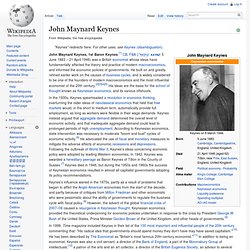
He built on and greatly refined earlier work on the causes of business cycles, and is widely considered to be one of the founders of modern macroeconomics and the most influential economist of the 20th century.[2][3][4][5] His ideas are the basis for the school of thought known as Keynesian economics, and its various offshoots. Online economics textbooks. Adam Smith, Wealth of Nations, Contents. Introduction.
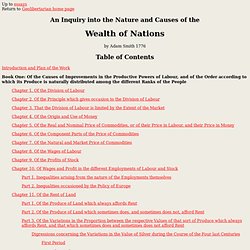
10 Lesser Known Economic Issues. Politics While not an economist in the traditional sense, I am very interested in the study of economics.

While not everyone shares this level of interest, I believe people should have an understanding of economics as the field is so important to understanding the world that we live in. Though this list contains ideas that are controversial, it is not intended to promote anger or controversy. Rather, these entries were chosen to shed some light on lesser known, yet important economic issues facing our world, and give readers something to ponder. Collateralized debt obligation. A collateralized debt obligation (CDO) is a type of structured asset-backed security (ABS).[1] Originally developed for the corporate debt markets, over time CDOs evolved to encompass the mortgage and mortgage-backed security ("MBS") markets.[2] Separate special purpose entities—rather than the parent investment bank—issue the CDOs and pay interest to investors.
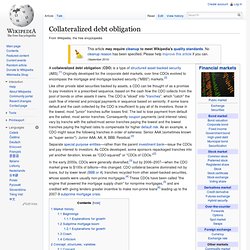
As CDOs developed, some sponsors repackaged tranches into yet another iteration, knows as "CDO-squared" or "CDOs of CDOs. "[2] In the early 2000s, CDOs were generally diversified,[3] but by 2006–2007—when the CDO market grew to $100s of billions—this changed. Market history[edit] Beginnings[edit] Until about 2005, CDOs were diversified, and might consist of everything from aircraft lease-equipment debt, manufactured housing loans, to student loans and credit card debt.
Paul Volcker. Paul Adolph Volcker, Jr.[1] (born September 5, 1927) is an American economist.
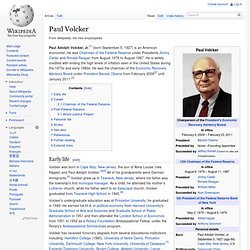
He was Chairman of the Federal Reserve under Presidents Jimmy Carter and Ronald Reagan from August 1979 to August 1987. He is widely credited with ending the high levels of inflation seen in the United States during the 1970s and early 1980s. He was the chairman of the Economic Recovery Advisory Board under President Barack Obama from February 2009[2] until January 2011.[3] Early life[edit] Volcker's undergraduate education was at Princeton University; he graduated in 1949.
Warren Buffett. Buffett is called the "Wizard of Omaha" or "Oracle of Omaha",[8] or the "Sage of Omaha"[9] and is noted for his adherence to value investing and for his personal frugality despite his immense wealth.[10] Buffett is a notable philanthropist, having pledged to give away 99 percent[11] of his fortune to philanthropic causes, primarily via the Gates Foundation.
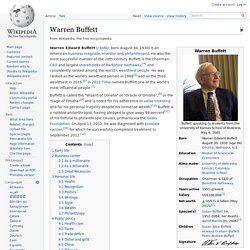
On April 11, 2012, he was diagnosed with prostate cancer,[12] for which he successfully completed treatment in September 2012.[13] Early life Buffett's interest in the stock market and investing dated to schoolboy days he spent in the customers' lounge of a regional stock brokerage near his father's own brokerage office. On a trip to New York City at age ten, he made a point to visit the New York Stock Exchange. Business career. Economics and Politics by Paul Krugman - The Conscience of a Liberal.
Home. Joseph Stiglitz. Joseph Eugene Stiglitz, ForMemRS, FBA (born February 9, 1943) is an American economist and a professor at Columbia University. He is a recipient of the Nobel Memorial Prize in Economic Sciences (2001) and the John Bates Clark Medal (1979). Imagespharma_small.jpg (JPEG Image, 575 × 2572 pixels) Deflation - The Opposite of Inflation. How It Can Grind the Economy to a Halt.
Actually, "the Rich" Don't "Create Jobs," We Do. You hear it again and again, variation after variation on a core message: if you tax rich people it kills jobs.
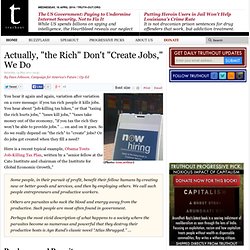
You hear about "job-killing tax hikes," or that "taxing the rich hurts jobs," "taxes kill jobs," "taxes take money out of the economy, "if you tax the rich they won't be able to provide jobs. " ... on and on it goes. So do we really depend on "the rich" to "create" jobs? Or do jobs get created when they fill a need? Here is a recent typical example, Obama Touts Job-Killing Tax Plan, written by a "senior fellow at the Cato Institute and chairman of the Institute for Global Economic Growth,"
The Texas Unmiracle. Some of these miracles will involve things that you’re liable to read in the Bible.
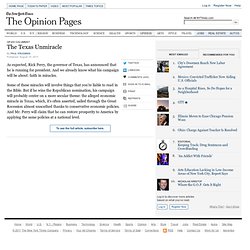
But if he wins the Republican nomination, his campaign will probably center on a more secular theme: the alleged economic miracle in Texas, which, it’s often asserted, sailed through the Great Recession almost unscathed thanks to conservative economic policies. And Mr. Perry will claim that he can restore prosperity to America by applying the same policies at a national level. So what you need to know is that the Texas miracle is a myth, and more broadly that Texan experience offers no useful lessons on how to restore national full employment. It’s true that Texas entered recession a bit later than the rest of America, mainly because the state’s still energy-heavy economy was buoyed by high oil prices through the first half of 2008.
Despite all that, however, from mid-2008 onward unemployment soared in Texas, just as it did almost everywhere else. In June 2011, the Texas unemployment rate was 8.2 percent.